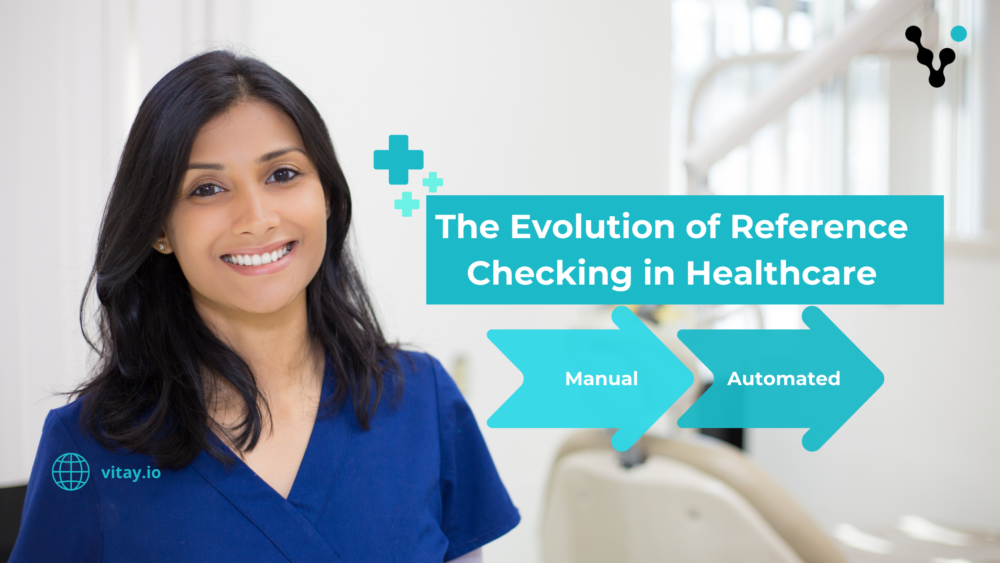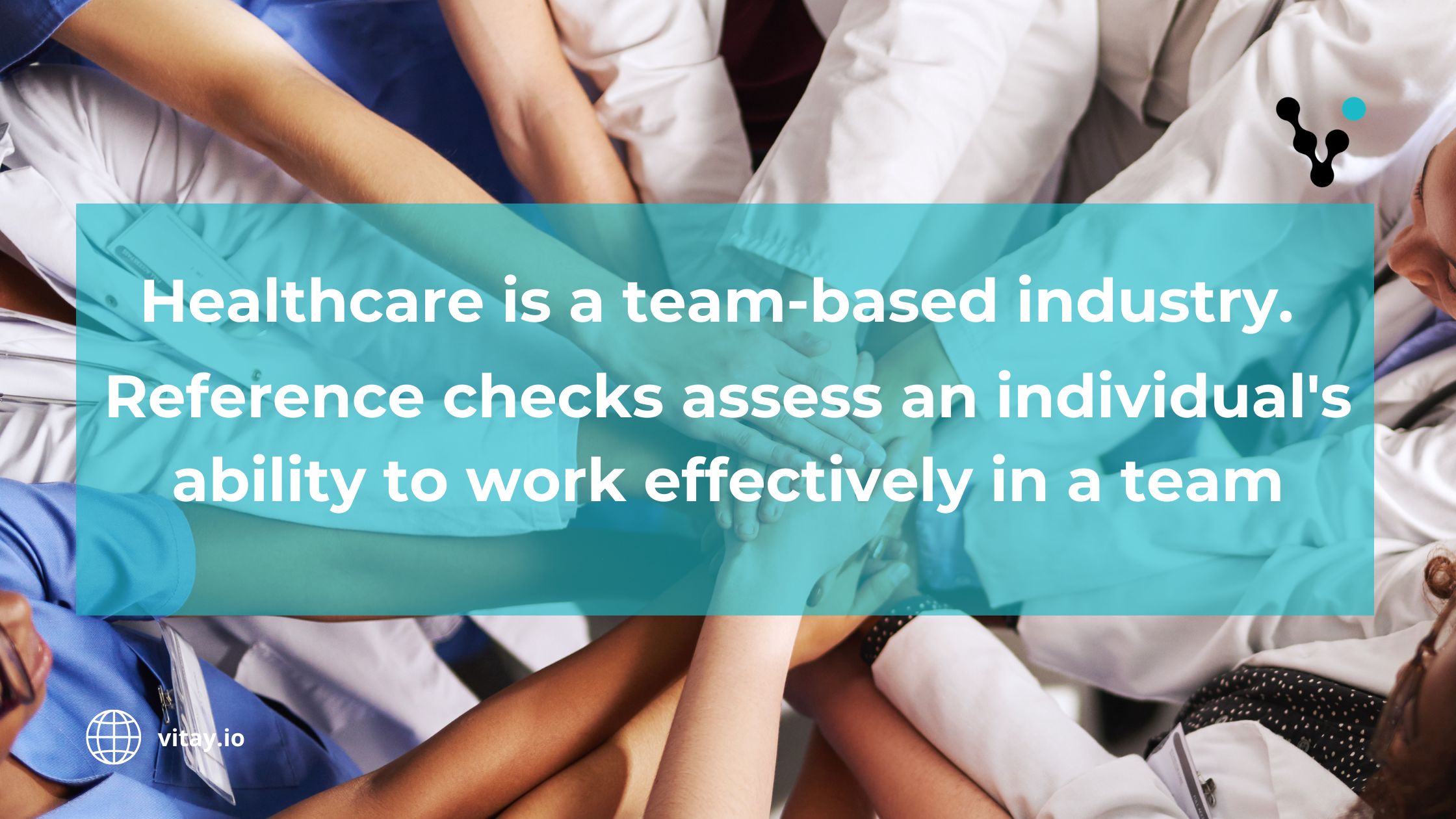The best hospitals and healthcare practices have a few things in common, and you might be surprised at what they are. Notably, most are able to make more educated decisions that lead to better hiring outcomes, and a big part of that is automated reference checking.
In the healthcare industry, reference checking plays a crucial role in ensuring the quality and reliability of healthcare professionals. Traditionally, reference checking was a manual and time-consuming process that involved contacting previous employers or supervisors to gather information about a candidate’s performance, skills, and work ethic. However, with the advancement of technology, reference checking in healthcare has evolved from a manual process to an automated one, resulting in increased efficiency, accuracy, and convenience. Here’s what healthcare leaders need to know about the evolution of reference checking in healthcare.
The Importance of Reference Checking in Healthcare
Many industries use reference checking as part of their hiring process, but for healthcare, it’s a crucial element. It’s not a “nice to have” piece of the puzzle, but an essential one for getting the right professionals in the door. Why?
Patient Safety
The safety of the people you care for is one of the best reasons to pay attention to reference checks. Healthcare organizations have a responsibility to ensure the safety and well-being of their patients. By conducting thorough reference checks, organizations can verify the credentials, qualifications, and past performance of potential employees, including healthcare providers. This helps to ensure that the individuals hired are competent and capable of delivering high-quality care, thus minimizing the risk of patient harm.
Regulatory Compliance
Healthcare organizations are subject to various regulations and standards set by government bodies and accrediting agencies. These regulations often require organizations to verify the background and qualifications of their employees. Reference checks help organizations demonstrate compliance with these regulations and mitigate the risk of legal and regulatory penalties.
Trust and Reputation
Healthcare organizations rely on the trust and confidence of their patients and the community. By conducting reference checks, organizations can ensure that they are hiring individuals with a track record of ethical behavior, professionalism, and integrity. This helps to maintain the organization’s reputation and build trust among patients and stakeholders.
Better Collaboration
Healthcare is a team-based industry, with multiple healthcare professionals working together to provide comprehensive care. Reference checks enable organizations to assess an individual’s ability to work effectively in a team, communicate well, and collaborate with colleagues. Hiring individuals with positive references and a history of teamwork can contribute to a harmonious and productive work environment.
Risk Management
This last factor is a bit of a combination of all of the others mentioned. Healthcare organizations face more threats than most, including legal, financial, and reputational risks. Reference checks help organizations identify any potential red flags or concerns about an applicant’s past performance, such as disciplinary actions or malpractice claims. By identifying such risks early on, organizations can make more informed hiring decisions and mitigate the potential negative impact on the organization.
The Early Days: Necessary but Cumbersome
Manual reference checking in healthcare often involved a series of phone calls or emails to obtain information from references – and for organizations that don’t use software, this is still the process. That method is not only labor-intensive but also prone to delays and inaccuracies. At one time, healthcare organizations had to allocate significant resources to manually reach out to references, wait for responses, and compile the information obtained. Additionally, the process was subjective, as the information provided by references could vary in quality and relevance.
Technology Brings Time-Savings
The improvement of reference checking in healthcare has been driven by the development of automated reference checking systems. These systems leverage technology to streamline the process, making it faster, more efficient, and more reliable. Automated reference checking platforms allow healthcare organizations to send reference surveys or questionnaires electronically, eliminating the need for manual communication. References can respond at their convenience, and the responses are automatically compiled and analyzed.
Enhanced Efficiency Through Automation
One of the key benefits of automated reference checking is the improved efficiency it offers. Healthcare organizations can now send reference requests to multiple references simultaneously, saving time and effort. The automated system tracks the progress of each reference request, ensuring that all necessary information is collected within a specified timeframe. This eliminates the need for repeated follow-up calls or emails, reducing the administrative burden on healthcare professionals.
Another advantage of automated reference checking is the increased accuracy and consistency of information. The system ensures that all references are asked the same set of questions, eliminating any potential bias or variation in the information obtained. This standardized approach helps healthcare organizations make fair and informed decisions when hiring or credentialing healthcare professionals. Additionally, automated systems often include verification processes to validate the authenticity of the references provided.
Beyond Employers: Better for Everyone
The evolution of reference checking in healthcare has also led to enhanced convenience for both healthcare organizations and references. If you’ve ever been a reference for someone, then you know how back-and-forth emails and scheduling a call can become a nuisance. While you’re happy to do it for your contact, you’d like it to take as little time out of your day as possible.
With automated systems, references can respond to reference requests at their convenience, without the need for ongoing communication. This flexibility allows references to provide more thoughtful and detailed responses, resulting in a more comprehensive assessment of a candidate’s qualifications. Plus, references will feel more comfortable sharing honest and candid feedback: Research tells us that people are more truthful in digital communication, for a variety of reasons.
Healthcare organizations can also access the reference information securely and quickly, enabling faster decision-making processes. Faster decision-making about candidates is extremely valuable to both the institution and the person hoping for the job. With Vitay, candidates are kept in the loop on the process, so they aren’t left frustrated in the dark.
The evolution of reference checking in healthcare from a manual process to an automated one has revolutionized the way healthcare organizations assess the qualifications of healthcare professionals – which is great for healthcare professionals and patients alike. The automated systems offer improved efficiency, accuracy, and convenience, saving time and resources for healthcare organizations and providing a more reliable and standardized assessment of candidates.
As technology continues to advance, we can expect further enhancements. With new developments in reference checking processes, we can continue to focus on the goals that all healthcare providers have in common: a higher caliber of healthcare professional and improved patient outcomes.







Comments are closed.